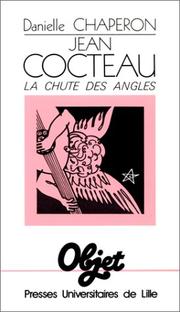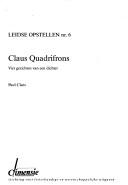| Listing 1 - 5 of 5 |
Sort by
|
Book
Year: 2014 Publisher: Firenze, Italy : Firenze University Press,
Abstract | Keywords | Export | Availability | Bookmark
 Loading...
Loading...Choose an application
- Reference Manager
- EndNote
- RefWorks (Direct export to RefWorks)
Carlo Marsuppini (1398-1453) is a well known professor at the Studio Fiorentino, Chancellor of the Republic, friend of Cosimo de' Medici and tutor of his children, translator of Homeric and pseudo-homeric works, author of private and, above all, public letters. His activity as a poet is less known: his writings in vernacular were so far entrusted to a handful of poems published in the collection Carmina illustrium poetarum italorum (1720). This book offers for the first time a rigorous critical edition of the humanist's poetic production, based on the analysis of the vast vast known manuscript tradition, and a broad commentary on the individual poems, of which a translation into Italian is also offered.
Marsuppini, Carlo, --- Poetic works. --- Criticism, Textual.

ISBN: 2859393730 2757426133 9782859393731 Year: 2020 Publisher: Villeneuve d'Ascq : Presses universitaires du Septentrion,
Abstract | Keywords | Export | Availability | Bookmark
 Loading...
Loading...Choose an application
- Reference Manager
- EndNote
- RefWorks (Direct export to RefWorks)
La poésie de Cocteau est le résultat d’une apparition, mieux, d’une annonciation où la parole coïncide avec une insémination phénoménologique. L’ange de cette annonciation est issu d’un univers parallèle, d’un au-delà de la conscience, des sens, du temps et de l’espace. Le poète est tantôt le provocateur, tantôt la victime, d’une sorte de transgression des limites sensorielles. Imaginaire de la perception psychique et cosmique : une invisible lutte avec la menace ou la tentation de sa visibilité possible, un ange s’égare hors de l’imperceptible, hors de l’inconscient. Cocteau configure à l’aide d’images empruntées à la science la répartition entre les mondes humains et angéliques et les variations de leur accessibilité réciproque. Il s’inspire dans le désordre des recherches sur la lumière, la relativité, la quatrième dimension, les ultrasons, la Chronophotographie, l’atome... L’ange est le paradigme d’un phénomène happé ou séduit par un dispositif, rendu perceptible par machine. Mais il s’invente un visage de monstruosité, de « montrabilité », opération qui seule le fait exister dans le mensonge, le langage, le manque. L’ange tel qu’il apparaît dans la scène de l’annonciation est amputé de toute sa folle richesse. La rencontre qui se voudrait amoureuse avec le poète est donc toujours insatisfaisante. L’homme ne peut que castrer cette merveille érotique à la mesure fatale de ses organes, de sa logique. Le poète est alors amené à ériger, sans joie, la matérialité de sa propre écriture en fétiche : objet artificiel mais sans défaillance.
Cocteau, Jean --- Angels in literature --- Anges dans la littérature --- Cocteau, Jean, --- Anges dans la littérature --- Poetic works --- Criticism and interpretation --- Critique et interprétation --- Cocteau, Jean, - 1889-1963 - Poetic works --- Poetic works. --- Literature (General) --- poésie --- angle --- phénomènologie --- montrabilité --- Kokto, Zhan, --- Cocteau, Clément Eugène Jean Maurice, --- Kokutō, Jan, --- קוקטו, ז׳אן, --- コクトージャン, --- Cocteau, Jean, - 1889-1963
Book
Year: 2012 Publisher: Vienna, Austria : Gesellschaft zur Förderung slawistischer Studien,
Abstract | Keywords | Export | Availability | Bookmark
 Loading...
Loading...Choose an application
- Reference Manager
- EndNote
- RefWorks (Direct export to RefWorks)
Die dichterische Sprache Puškins. In kyrill. Schr., russ. Durchsuchbare elektronische Faksimileausgabe als PDF. Digitalisiert im Rahmen des DFG-Projektes Digi20 in Kooperation mit der BSB München. OCR-Bearbeitung durch den Verlag Otto Sagner.
Pushkin, Aleksandr Sergeevich, --- Poetic works. --- Criticism and interpretation. --- Style. --- fakt --- Gasparov --- istorii --- jazyk --- jazyka --- Linguistik --- literaturnogo --- Philologie --- Poetičeskij --- Puškina --- russkogo --- Slavische Sprachwissenschaft --- Slavistik --- Sprachtheorie
Book
ISSN: 00851671 ISBN: 9783525252871 3525252870 3666252877 Year: 2010 Volume: 177 Publisher: Vandenhoeck & Ruprecht
Abstract | Keywords | Export | Availability | Bookmark
 Loading...
Loading...Choose an application
- Reference Manager
- EndNote
- RefWorks (Direct export to RefWorks)
St. Gregory of Nazianzus' (ca. AD 330-390) classicizing Christian verse is the earliest Greek verse of its kind that survives in any great quantity. This is a critical edition, with introduction and commentary, of four poems (I.2.17; II.1.10, 19, 32). The commentary is primarily linguistic, but attention is paid to historical and theological matters. The poems' fate in Byzantium is also examined and three Byzantine paraphrases are edited in an appendix.The introduction examines features of Gregory's poetry in general. Gregory was an enthusiastic reader of Callimachus and his use of poetic allusion deserves special attention.
Christian poetry, Greek --- History and criticism --- Gregory, --- Poetic works --- History and criticism. --- Poetic works. --- Poésie chrétienne grecque --- Histoire et critique --- Greek Christian poetry --- Greek poetry --- Bogoslov, Grigoriĭ, --- Bogoslov, Grigorije --- Grégoire, --- Gregor, --- Gregorio, --- Gregorio Nazianzeno, --- Grēgorios, --- Gregorios, --- Gregorius, --- Gregorius Nazianzenus, --- Gregory Nazianzen, --- Grigol, --- Grigorie, --- Grigoriĭ, --- Grigoriĭ Bogoslov, --- Ighrīghūriyūs, --- Nazianz, Gregor von, --- Nazianzen, Grigoriĭ, --- Nazianzenus, Gregorius, --- Nazianzus, Gregory of, --- Sfântul Grigorie, --- Богослов, Григорий, --- Григорий, --- Григорий Богослов, --- Γρηγόριος, --- Languages & Literatures --- Greek & Latin Languages & Literatures --- Grego., --- Nazian., Grego., --- Christian poetry, Greek - History and criticism --- Gregory, - of Nazianzus, Saint - Poetic works --- Classics --- A Greek–English Lexicon --- God --- Göttingen --- Homer --- Gregory, - of Nazianzus, Saint

ISBN: 9064120706 9789064120701 Year: 1987 Volume: 6 Publisher: Leiden Dimensie
Abstract | Keywords | Export | Availability | Bookmark
 Loading...
Loading...Choose an application
- Reference Manager
- EndNote
- RefWorks (Direct export to RefWorks)
Claus, Hugo --- Claus, Hugo, --- Criticism and interpretation --- 839.3 "19" CLAUS, HUGO --- Nederlandse literatuur--20e eeuw. Periode 1900-1999--CLAUS, HUGO --- -Criticism and interpretation --- Lerarenopleiding --- (vak)didactiek talen --- 839.3 "19" CLAUS, HUGO Nederlandse literatuur--20e eeuw. Periode 1900-1999--CLAUS, HUGO --- (vak)didactiek talen. --- -van Male, Dorothea --- van Male, Dorothea --- Criticism and interpretation. --- Poetic works --- Claus, Hugo Maurice Julien --- van Astene, Hugo C. --- Ghekiere, Anatole --- Klaus, Hugo, --- Klaous, Ougko, --- Klaus, Chugo, --- Hyoens, Jan, --- Streiner, Thea, --- Astene, Hugo C. van, --- Male, Dorothea van, --- Ghekiere, Anatole, --- Klaus, Hugo --- Klaous, Ougko --- Klaus, Chugo --- Hyoens, Jan --- Streiner, Thea --- Astene, Hugo C. van --- Male, Dorothea van --- Claus, Hugo, - 1929-2008 - Criticism and interpretation --- 633 Literaire auteurs --- 947 Vlaamse en Belgische hedendaagse geschiedenis --- Claus, Hugo, - 1929-2008
| Listing 1 - 5 of 5 |
Sort by
|

 Search
Search Feedback
Feedback About
About Help
Help News
News